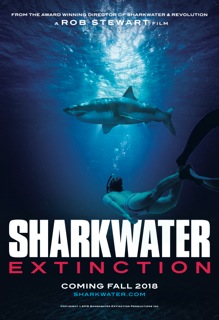You will meet people in your life that will feel like vessels of change. After they come into your life, they will fill that empty space you had reserved for the moment you told yourself, you were going to help save the planet and it’s species from extinction. If you’ve never pledged those words to yourself, it is not too late.
In life there is good and bad. It shows its face in our actions, our commitments and our choices. No matter where you go in the world, these commonalities exist. If your freedom of choice upon being informed of a great travesty is exercised, you do have the ability to evoke change. Positive change.
Rob Stewart is a conservationist, biologist, activist, filmmaker and a hero to many. He is also an award-winning director and his latest documentary film Sharkwater Extinction, had recently premiered at this summers Vancouver International Film Festival. It will open in theatres across Canada on Oct. 19th. Sharkwater Extinction is a follow-up to the critically acclaimed Sharkwater, Rob Stewart’s first film, which brought the issue of shark finning into the spotlight and our conscience. Sharkwater Extinction is a thrilling and inspiring action-packed journey. Stewart continues to investigate the corruption behind a multi- billion-dollar pirate fishing trade and massive illegal shark fin industry. He leads the courageous crusade through oceans and across 4 continents. From West Africa, Spain, Panama, Costa Rica, France, and even North America, Stewart exposes the shocking truth that is leading to the extinction of our oldest remaining predator and ultimately to the destruction of our planet. Rob Stewart sadly past away in a scuba diving accident a year and a half ago. His parents, Brian and Sandy Stewart are the producers of Sharkwater Extinction.
I recently had the very distinct pleasure of meeting with and speaking to Brock Cahill and Julie Anderson. Brock has been a diver, activist and friend of Rob’s for over 10 years. He’s travelled extensively around the world with Rob and has helped with logistics, shooting underwater footage and been an ardent conservationist. Brock is also the Founder of the Sea Change Agency. He also appears in the film. Julie is a collaborator and passionate activist as well as a marketing consultant. She is also the founder of the non-profit Shark Angels. Since being inspired by Sharkwater, Julie has partnered with Rob to start United Conservationists in leading a Fin Free movement throughout the world to ban shark fin.
After Rob’s passing award-winning editor Nick Hector was given the daunting task of sifting through Rob’s copious hours of footage and reams of detailed notes to create a final cut of Sharkwater Extinction. Award-winning documentary filmmaker Sturla Gunnarsson who acted as a consultant to the team supported his efforts.
“What was it that prompted the making of this film?”
Brock answers, “It all began with Rob Stewart, he started this movement over twelve years ago and the release of Sharkwater in 2006. Rob ignited a fire/revolution for people wanting to get involved in shark conservation. Previous to his foray into this, nobody was really aware that sharks were being massacred and desecrated at the level they were. Most people view them as monsters and mindless killing machines but Rob was able to portray sharks in a light that showed them as beautiful vital creatures and a very important part of the eco system in our oceans. Without the oceans we wouldn’t have over 50% of the oxygen we breath. To take an apex predator out of the sea is a risky proposition at best. Rob had started this whole deal… unfortunately he had an accident and died a year and a half ago whilst making part three of this series. Without him, we’ve had to shore up and continue with the mission. That’s why Julie and I are here instead of him.”
“Were you both involved throughout the duration of this film?”
Julie answers, “We both have a very similar story. When Rob made Sharkwater, it was all about shark-finning; which is essentially taking sharks out of the ocean and slicing their fins off while their alive and throwing them back into the ocean. 90% of the shark is wasted and all of the sharks die a horrible death from drowning and suffocation. They take all the fins because of their value due to shark fin soup in Asia. In the last 30 years the shark population has dropped up to 99 percent in certain waters. It’s really because of the rise of middle-class in Asia and also the consumption of shark fin soup, not just in China but in emerging countries like Thailand, Japan and India. It’s become a status cymbal, similar to a bottle of champagne when you’re welcoming your guests; in certain cultures they serve shark fin soup instead. Sharkwater has made a huge impact on that issue. When it came out 11 years ago, I went to the screening in New York City and had heard about this amazing young guy that made this incredible film. He risked his life several times and almost died 3 or 4 other times to expose this industry. It’s rife with corruption, government corruption and the mafia. It’s the same players that are involved in the drug cartel, human trafficking and guns. It’s serious business and he put his life on the line in order to save sharks while showing his passion, I believe that’s what people gravitated toward. Long story short, it’s what Brock and I gravitated toward 11 years ago.
I was an ad executive when I went to see his film and was blown away by this amazing young guy, this real life adventure hero who cared so much about the oceans he was willing to put his life on the line. He had this way about him; his strength, this power and this passion. You just knew he was going to change the world and you wanted to be a part of it. Within 4 days I quit my job and sold my business, went up to Toronto with a notebook full of information on ideas I had on how to save sharks. That was 11 years ago, 3 nob-profits and 2 films later. 150 million live in a place where shark fin is an illegal substance, thanks to Rob and the campaigns we worked on. It’s been an incredible ride and Rob has influenced and inspired so many lives, which is why we’ve both worked with him for 11 years.”
“Do you work on the political side of the cause or do you both dive as well?”
Both answer, “Rob really changed the landscape in terms of documentary filmmaking. He really made it more about adventure and there was such an incredible story being told about this hero that you wanted to follow him and really get involved; that was the other component to it. Rob wanted to create entertainment but he also wanted to make entertainment that drove action. With Sharkwater, he started a campaign called Fin Free, which was to ban the sale of shark fin. They’re bills right now on the table in the US senate and in Canada to ban the import and export of shark fin. With Sharkwater Extinction, it’s about getting shark products out of our daily lives. It will shock you when you realize where sharks exists in our daily lives. As a conservationist, it was even in my life. I was consuming it. He’s got a new campaign called Shark Free, which is basically getting shark out of all your products and being an informed consumer.”
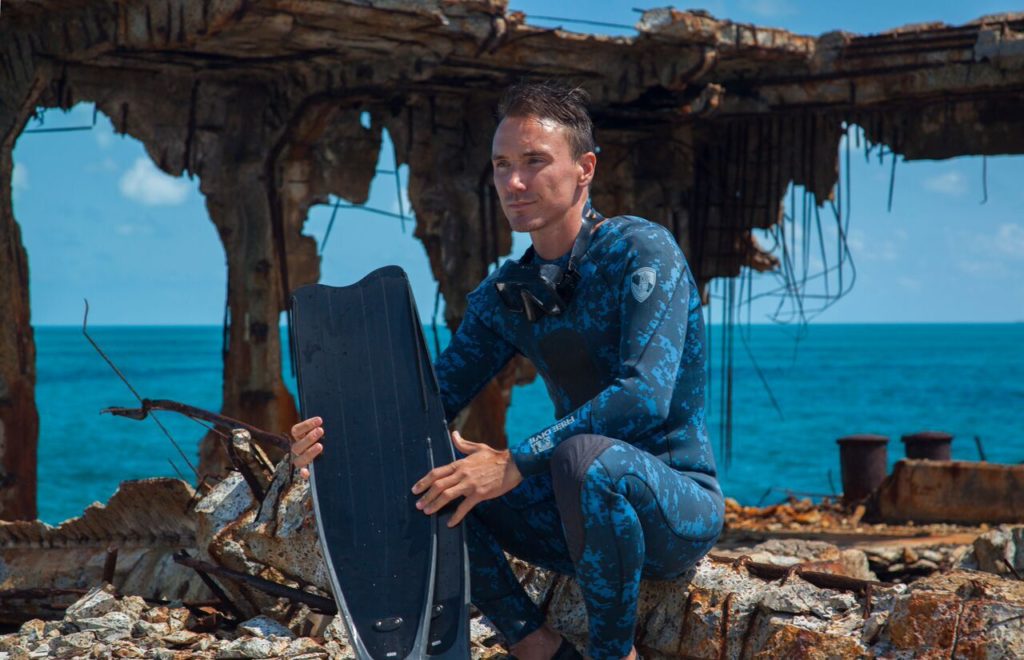
“What kinds of products would you be referring to that I might not be aware of?”
Brock answers, “It runs the gamut; you can find shark product in everything from fish that’s mislabeled for human consumption, all the way down to fertilizers and pet food, cosmetics and different kinds of moisturizers. It also gets reprocessed into fish meal pellets that are consumed by farmed shrimp, salmon and different kinds of fish in the eco system that are on the lower level of the food chain than sharks. It’s out-of-bounds when tiny shrimp are eating a massive apex predator in the ocean. It’s not a good plan and it’s like playing God. It’s throwing things out of order.”
Julie adds, “Sharkwater was about shark-finning and Rob and I were in the field in Japan at a tuna fishing port. The day we were there filming, they landed 7000 sharks. If you play that forward, that port alone is landing 2 million sharks per year. They were creating these massive piles as they unloaded them from the boat. There were blue sharks, salmon sharks and mako sharks. After they unloaded we waited for them to begin finning but instead they took the mako and chopped it up for meat; they took the salmon shark and removed the liver, the heart and other organs. The blue sharks were taken away so we followed them to discover they were going to fertilizer and pet food plants. That was the start and genesis of Sharkwater Extinction which was, 70 million sharks are being killed a year for their fins but there are another 80 million that scientists can’t account for. Rob really wanted to find out where they were going. He found that they were going into your home; they’re in cosmetics, sunscreen, deodorant, lipstick, eye shadow and other products that may contain squalene. Which is either a vegetable derived oil or a shark liver derived oil. Most cosmetic companies tend to use shark and they don’t have to label it. The burden is on the consumer to try and figure out what products shark is in. A lot of fish is being sold as fish but it’s really shark. Imitation crab or surimi often has shark in it. There are eighteen different names for fish in the English language alone. It is actually shark but it doesn’t contain the word ‘shark’ in it, so you’re actually eating it, not knowing that it’s shark. And just because you’re not eating shark fin soup, it doesn’t mean that you’re not contributing to a massive issue.”
Both add, “Being an apex predator, the contaminants, PCB’s, neurotoxins and mercury all build up on an exponential level. In sharks, they are concentrated to a degree that is really unsafe for human consumption. The Mako shark is often relabeled as swordfish. They target Mako specifically because they can catch it and sell it as swordfish, which drives a huge price at market considering Swordfish is quite expensive in restaurants. In Canada, Oceana recently released a report indicating that 44% of all its fish is mislabeled. There is a neuroscientist in Florida that’s completed an in depth report on the effects of women and children eating shark and found all sorts of brain disorders and misalignments were due to eating shark.”
“I always thought most fish containing Omega 3 were healthy for you. Is that not the case with sharks?”
Brock answers, “If it’s healthy and unpolluted but unfortunately, in the food chain the levels of contaminants go up the higher you go up into the food chain because they have longer lives and consume a diet of smaller feeding filter fish that start to build up in their tissues. Once you get to the shark it’s on a massive scale.”
Julie adds, “It’s like lead, their bodies can’t get rid of it. Through bio-magnification we’re putting all this unprocessed pollution into the oceans. It gets into the shrimp and then you multiply that into the fish and multiply that into the shark.”
Brock adds, “We’re not even seeing the effects of what that means to humanity and other species, such as your housecat for instance. We had mentioned that it’s in pet food and for almost all wet pet foods, there lists some sort of oceanic whitefish/shark. We’re unwillingly giving our pets brain cancers and neuro-disorders. If you think your cat is crazy, maybe take a look at the foods they’re eating.”
“So, if companies are avoiding labeling the ingredients as shark. What are they calling it?”
Brock answers, “It could be labeled as oceanic white fish, flake white fish or rock salmon.”
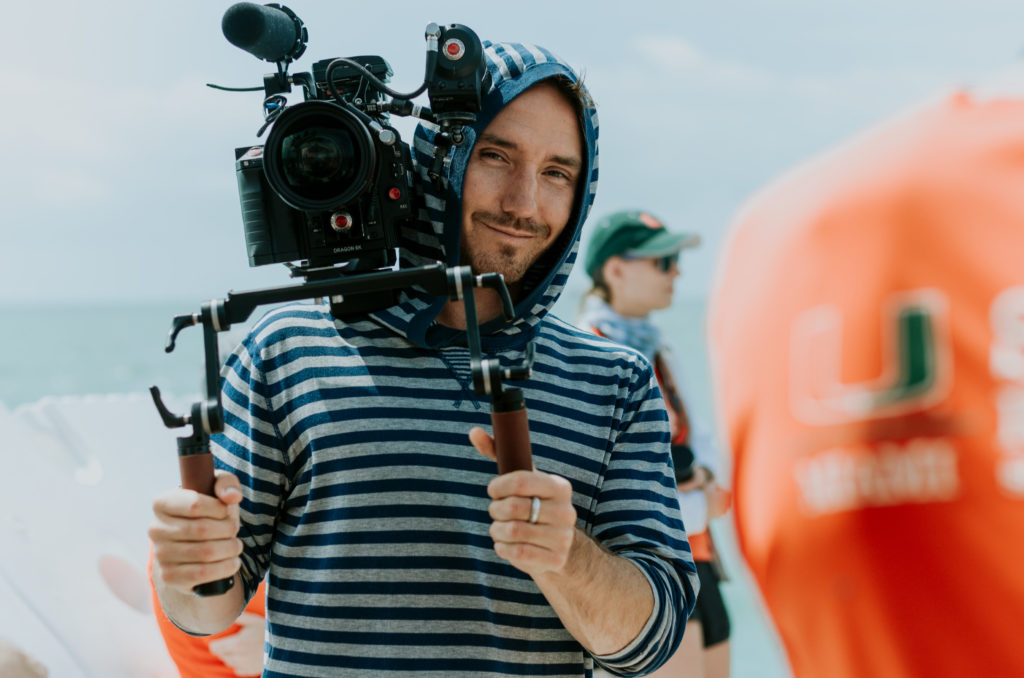
“I’m wondering why there isn’t more regulations in place?”
Brock answers, “That’s one thing we’re pushing for really hard. It’s a hot topic right now, the mislabeling of food products and really knowing what you’re eating. It’s a big deal in the US right now. Whole Foods and everybody else is going to bat to get ingredients listed on the label and to be true of that. We have to stand up and make sure that happens because the industry isn’t going to.”
“It sounds very daunting. How do you ensure that the right people are going to make the effort it deserves?”
Both answer, “Rob believed that the camera was the best tool in our conservationist arsenal to save the oceans and the planet. He proved it with Sharkwater and all the amazing things that has happened since its release, including the fact that 12 million square miles of the ocean were set aside as shark sanctuaries after Sharkwater, all thanks to the movement that Rob started. One person can make a difference especially with a camera. This campaign started with Sharkwater Extinction and getting the word out. From there, we need to have the action-orientated arm to it. We are currently in the process of developing Shark Free, which is a campaign to educate consumers, help them understand which products contain shark while putting pressure on the industries to stop using shark. For instance, in the cosmetic industry sqaulene can be made from olives or from shark. Why wouldn’t the industry use olives, because it’s more expensive and not as easy as shark liver oil.
Brock adds, “It sounds crazy that fishing for deep sea sharks can be cheaper than farming olives but it’s subsidized by the government in the way of their fuel. Their efforts are subsidized and it’s really off balance because there’s no way that fishing for shark’s costs less than farming soya beans, which you can use for the same products.”
Both add, ‘As a consumer you want to know what products contain shark but you shouldn’t have to become a detective and read through the ingredients to find out where the sqaulene came from on every lipstick label. Companies don’t have to disclose it so we’ve started testing products. It’s a huge undertaking and we’ll be kicking off a crowdsourcing initiative, where the consumer makes a donation to have products tested. Pet foods, fertilizers, make-up; we’ll test it. We found shark sqaulene oil in many popular brands of cosmetics. We’re careful not to disclose it because Rob had a very positive way of approaching everything. Rather than fight against it, he wanted to work with people, so we’re going to give the organizations the chance to do the right thing and step up. If they don’t we’ll put pressure on them. We found shark in 50% of the pet food we tested as well as a considerable amount of fish patties, surimi, imitation crab and incidentally, if you go to a fast food restaurant, most of those fish patties will contain shark. If you go to London and order ‘fish n chips,’ you think it’s Cod, but most of it is shark.”
“Through your research, have you been able to identify the biggest violators/offenders?”
Julie answers, “We have and we were quite surprised at who it was. The two biggest countries doing the most amount of shark fishing, is the US and the European Union. They’re not necessarily doing it in their waters, they’re doing it in global waters. I was in Kurabas (Ethiopia) in the middle of nowhere boarding a fishing vessel from the US as well as a Spanish vessel, while working closely with the coastguard. I was running a Sea Sheppard program at the time and had the coastguard and local police onboard. The inherent problem is that International waters are not regulated. Organizations like Sea Sheppard help fill a very valuable hole but it would really take millions of boats in the oceans to protect it. You also need the political willpower of the countries to enforce the laws once you find these vessels. What we find more often than not is corruption. A slap on the wrist, the government turning the other way.”
Brock adds, “ It gets worse, sometimes there’s a pat on the back or a handshake with an exchange of money and they’re on their way.”
Julie adds, “Canada imports and exports the largest amount of shark fin outside of Asia. This isn’t a cultural issue, it’s not specific to one country, it really is up to all of us to be smart educated consumers and stop the demand. At the end of the day it’s public pressure and being smart with how we spend our dollars that can stop this.”
Brock adds, “Another part of taking away the demand is speaking up to say ‘this isn’t right’. If our citizens could have a unified movement toward positive change, it’s amazing what can be accomplished. In California we were fighting against a driftnet fishery. Driftnets are these mile long nets that hang down 130 feet under the water and they catch everything indiscriminately. Rob and I were working together on this fishery for quite some time when we came to realize it’s happening in our own back yard, the place we’ve come to think of as ecologically conscious and environmentally friendly. We went out and filmed it and then posted it all over the place. Just yesterday it passed through and signed by house and senate and now by the governor of the state to have the fisheries faze out the practice. Because the public was able to see what was happening, they’ve stood up to say ‘NO WAY, NOT IN OUR WATERS!’ It’s been a huge victory.”
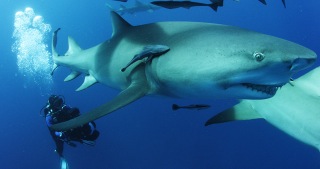
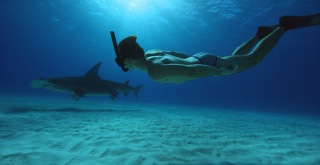
“It’s great to see that your efforts are having an impact.”
Brock replies, “It’s a victory that we’re extremely proud of because it embodies what Rob was saying the entire time; the camera is a great weapon, unifying the people is the way to make change, voicing with your knowledge is the way to stand up.”
Julie adds, “There is so much money at stake; it’s really a life and death situation at times. In the film, there is a scene where Rob and Brock are putting their lives at risk in order to expose this. As conservationists, we’re in the line of fire against people that are outgunning us; they have more money, they’ve got training and are not afraid to commit illegal crimes. We are just trying to save the planet.”
Brock adds, “When you watch the film you’ll see how well Rob explains it through the visual evidence, the beauty and the challenges. Once you do, you will get it. Rob narrated the entire film and left copious amounts of notes on how he wanted the film to be constructed. This truly is his masterpiece that comes after 19 months of hard work. He is our hero and one that the planet desperately needed at this time of flux. We’ve taken it upon ourselves to help continue pushing the mission forward.”
“Have you been all over the world in your research?”
Julie answers, “I’ve been to 14 different countries with Rob going undercover and documenting what’s going on from a shark-finning perspective and a shark fishing perspective. It’s changing before our very eyes and we really have to stay on top of it. As other fish stocks plummet and as other changes happen in the environment, the sharks sit on the crux of these issues and they’re taking a lot of pressure.”
Brock adds, “They are a cornerstone species. Without sharks I don’t think any of us would survive. No species is safe on this planet, so we really need to take a look at this in a drastic way. It’s one of the most pressing issues we have in front of us. If the eco system goes out of whack and the oceanic life force on the planet goes down, we all go down.
This film has reminded me that a concerted effort is needed for positive change. If you’d like to get involved or want more information, you can reach them through www.sharkwater.com.

